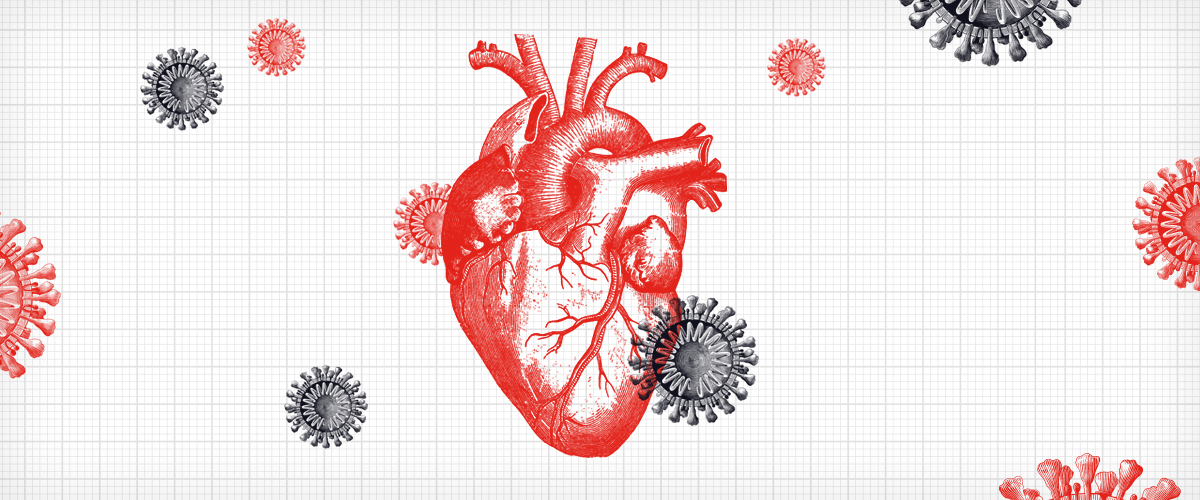6 Things to Know About Heart Health and COVID-19
A cardiologist breaks down how COVID-19 affects the heart, symptoms to watch for, and what’s important to know for recovery.

We’ve heard a lot about the effects of COVID-19 on the respiratory system, but experts are seeing concerning evidence of the viral infection’s impact on the heart as well — even in people with no underlying health conditions.
“It’s important for people to be aware that COVID-19 can affect their heart, and tell their doctor if they’re experiencing symptoms like shortness of breath, chest pain, lightheadedness, or palpitations,” says Dr. Holly Andersen, an attending cardiologist at NewYork-Presbyterian/Weill Cornell Medical Center and director of education and outreach for the Ronald O. Perelman Heart Institute.
Health Matters spoke to Dr. Andersen, who is also a clinical associate professor of medicine in the Division of Cardiology at Weill Cornell Medicine, to find out what people should know about COVID-19 and the heart.
1. Even people who had mild COVID-19 disease and no pre-existing conditions may experience cardiac issues.
COVID-19 patients with cardiovascular risk factors — such as obesity, diabetes, hypertension, and high cholesterol — are most at risk for heart complications. But even patients who don’t have underlying conditions could face heart issues, says Dr. Andersen.

Dr. Holly Andersen
She points out a prospective study conducted at the University of Frankfurt that used cardiac MRI to examine the hearts of 100 people who had recovered from COVID-19, most of whom got better at home. The imaging detected heart problems in 78% of patients — even two to three months after COVID-19 diagnosis — with ongoing inflammation of the heart muscle (myocarditis) found in 60% of patients. In the same study, blood tests revealed elevated levels of a protein called troponin, which help detect heart injury. Blood levels of troponin remained elevated in 71% of patients, and significantly so in 5%.
Other studies have shown that nearly one in four people hospitalized for COVID-19 experience heart problems such as impaired pumping ability (left ventricular dysfunction) and abnormal heart rate (arrhythmia). The link between COVID-19 and heart damage was present independent of pre-existing conditions, disease severity, and other possible factors. Two-thirds of the patients had mild illness, and the mean age was only 49.
2. The inflammation that COVID-19 can cause throughout the body may affect the heart.
When bacteria and viruses invade the body, white blood cells surround and protect the area that’s under attack, causing what’s known as inflammation. Inflammation can be short-lived or chronic, and excess inflammation can lead to disease and other problems in the body.
“Widespread inflammation in the body can cause the heart to become inflamed,” says Dr. Andersen.
While researchers are still studying how COVID-19 damages the heart, Dr. Andersen explains that doctors have a good understanding of the effects of inflammation on heart function:
- Widespread inflammation in the body, such as that caused by the novel coronavirus, can cause inflammation of the heart muscle (myocarditis), which can reduce the heart’s ability to pump and cause arrhythmias. “Anytime there is inflammation of the heart muscle, there is a greater risk of arrhythmia,” says Dr. Andersen.
- Inflammatory proteins called cytokines, which the immune system releases to combat COVID-19, can lead to blood clots in tiny blood vessels in the heart.
- Lung inflammation and blood clots in the lungs can strain the right side of the heart, which pumps blood to the lungs to be oxygenated.
- The virus itself can invade and multiply in heart muscle cells and cause myocarditis.
3. Coronavirus-induced stress can also lead to heart problems.
The stress of being ill or even intense fear of the pandemic may impair heart muscle function by causing stress cardiomyopathy, a disease of the heart muscle also known as “broken heart syndrome” or Takotsubo cardiomyopathy. “Increased stress can also trigger a heart attack in some people,” says Dr. Andersen.
It’s important for people to be aware that COVID-19 can affect their heart, and tell their doctor if they’re experiencing symptoms like shortness of breath, chest pain, lightheadedness, or palpitations.
Dr. Holly Andersen
4. Fear of COVID-19 may have caused people to delay heart care during the pandemic.
There has also been an indirect effect of COVID-19 on heart health. “We didn’t see heart attack patients coming in at the beginning, and that’s because they stayed home,” says Dr. Andersen. The number of people dying at home of heart attacks rose significantly, possibly because they believed going to the hospital for treatment would expose them to the coronavirus. The FDNY reported that during the first week of April 2020 in New York City, there was a 400% increase in out-of-hospital cardiac deaths compared with April 2019, Dr. Andersen points out. “And people who did come to the hospital with heart attack symptoms had worse survival because they often waited longer before seeking help,” she adds.
Recent studies from the Journal of the American College of Cardiology also showed that death from heart disease in the U.S. increased during the COVID-19 pandemic over the prior year, while globally COVID-19 was associated with significant disruptions in cardiovascular disease testing.
Dr. Andersen says it remains important to contact your doctor if you experience symptoms such as shortness of breath upon exertion that feels new or different, chest pain, heart palpitations or irregular heartbeat, or lightheadedness or dizzy spells.
5. People who have had COVID-19 should ease back into physical activity under the guidance of their healthcare providers, especially if they had symptoms.
The benefits of physical activity are well known, but if you’ve had COVID-19, your return to exercise needs to be gradual. “Because of the dangers of ongoing inflammation, we really recommend a slow escalation of the return to physical activity after recovering from COVID-19,” says Dr. Andersen. “Avoid doing too much too soon.”
If examinations such as electrocardiography, echocardiography, and blood tests suggest you have myocarditis, you may need to wait at least three to six months before returning to exercise. It’s important to resume any physical activity under the guidance of your doctor.
6. CPR saves lives, and you can perform it safely during the pandemic.
With the increase in home heart attacks during the pandemic, Dr. Andersen, a heart health advocate, reminds patients of her longtime #HandsOnlyCPR campaign, whose message is that more lives can be saved with hands-only CPR. The technique takes less than a minute to learn and can double or triple a person’s chances of survival.
“You can still do CPR during COVID-19 while protecting your own health,” says Dr. Andersen. With hands-only CPR, no breaths are required — just compressions.
“Everyone should know how to save a life,” she says.
